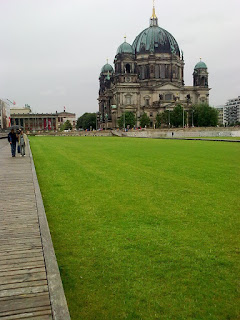Thus, despite never having visited Berlin, I could participate in conversation on this German Capital. Berlin, I used to say, was more like Brussels. The Tale of Four Cities. You had Paris and London on the one hand, glamourous & rich, decadent & gorgeous, and Berlin and Brussels on the other, hodge-podge eclecticism, an assembly of a convoluted history and a bustling present.
Like they say, even a broken clock is correct twice a day.
So guess what, turns out I had an actual point.
Berlin Is like Brussels. Be it a lot bigger.
You have ugly buildings wedged in between temples of the past. You have gargantuan squares surrounded by fake reconstructions. You have a troubled past.
You have, in short, a city to fall in love with.

And I think I did. Like so many before me, I have grown to really like Berlin, despite the shortness of my visit.
This liking grew gradually. The overcast skies did not prevent us from seeing some (for it would be preposterous to think we saw even a glimmer of the wealth of Berlin) of the highlights.

The click however, came in a moment of unplanned queasiness. I passed on a museum visit my entourage was to engage in, and instead elected to wander around a bit. I sat listening to some street artists (violin & guitar playing, amongst others, the schlinder's list theme), I walked around, I wandered. I roamed. I was at peace.

I will be back.

